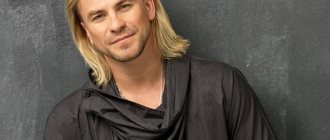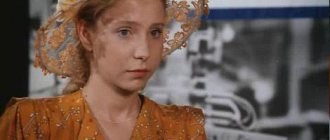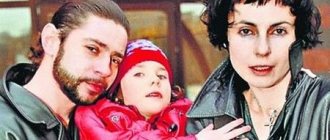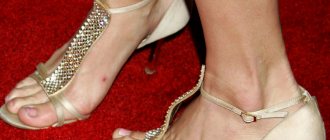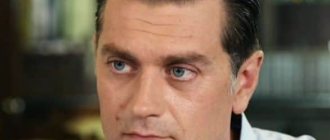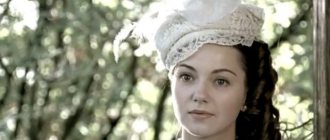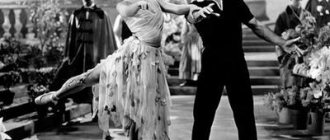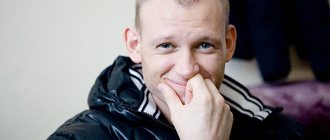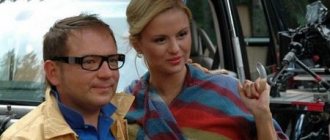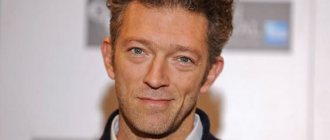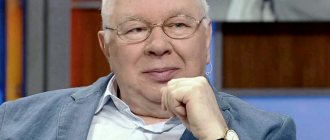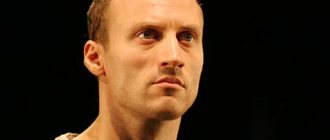Biography of Andrei Burkovsky
Andrei Burkovsky's career began in KVN, but very soon went far beyond the scope of the program. A wide audience learned about the actor thanks to the comedy sketch show from STS “Give You Youth” and the TV series “Kitchen”. Recently, he has been realizing himself in the dramatic genre (such works include the series “Call DiCaprio!”), and also plays in the Moscow Art Theater. Chekhov.
Actor Andrei Burkovsky
Childhood
Andrey was born on November 14, 1983 in the Siberian city of Tomsk. His father is a well-known businessman in the city, he owned the Siberian Pancakes fast food chain, his mother is a restaurateur, owner of the Slavic Bazaar and Eternal Call establishments, notable for the fact that Vladimir Putin and Angela Merkel dined there in 2006 .
Andrey Burkovsky in childhood
Burkovsky had a 6-year younger brother, Alexander, who died at a ski resort in 2009 - during the descent he crashed into a tree and died on the spot from his injuries.
Andrey Burkovsky with his brother Alexander
Andrey began playing in the school KVN team “Fragments of Stars” while still in high school at the lyceum, which he graduated from in 2000. At the age of 16, the young man, who graduated from school with a silver medal, was thinking of entering theater school, but his parents, especially his mother, insisted on a “serious” education. So Andrey became a student at the Faculty of Law of Tomsk State University. But he didn’t give up playing KVN, especially since in those years in his native Tomsk there was a rise in this genre - two years earlier, the local team “Children of Captain Schmidt” became the champion of the Major League.
School photo of Andrey Burkovsky
The members of the university KVN team “MaximuM” (the founding date is considered to be March 17, 2000) were very loved by the teachers and were given complete freedom of action. Also at this university there was a powerful theater group “Boniface” (where “Schmidt’s Children” and then “Maximum” were born), which aroused Burkovsky’s interest in the acting profession. He actively performed as part of the troupe, which is why he was even forced to take academic leave. There were thoughts of giving up everything and becoming an actor, but he still graduated from university and received a law degree in 2005.
Biography
Andrey Burkovsky was born into a family of successful entrepreneurs involved in the restaurant business. While still at school, he began playing in KVN, playing for the Oskolki Zvezd team.
The artist recalls: “At the age of 16, I graduated from school with a silver medal and told my parents that I was going to enter the theater institute. My father, who hoped that I would go into the restaurant business, did not expect this. He gave me the example of the violin maker Stradivarius, who told his sons that if they did not continue his work, it would die. And the sons followed in their father's footsteps. I understood that I couldn’t do business, it wasn’t my thing. But my parents insisted, and I had to go to study at the Faculty of Law of Tomsk State University. At the same time, I also graduated from the Faculty of Foreign Languages, but I was still drawn to creativity: I played in KVN and in the local theater of pop miniatures “Boniface”.
KVN
Andrey Burkovsky has been a member of the MaximuM team almost since its founding.
In 2000, she became the champion of the Tomsk KVN League, as well as the vice-champion of the KVN Asia League and the bronze medalist of the KVN-Siberia Interregional League. In 2002, the comedy group led by Mikhail Bashkatov made it to the finals of the First KVN League. On the wave of success, the actor left the Bonifas theater and plunged headlong into preparing new jokes and stage numbers for the Maximum team. In 2003, the group first appeared on television as part of the Jurmala festival “Voting KiViN”. Thanks to their outstanding performance, Tomsk residents receive an invitation to the KVN Premier League, broadcast on Channel One.
“Maximum” in Jurmala (2008) In the debut season, the team reached the finals, where they shared first place with the Moscow team “Megapolis”. The following year, the guys from Maximum entered the KVN Major League, but lost in the first game. By decision of the jury, the team was returned to the Premier League, where it became champion for the second year in a row.
Andrey Burkovsky in KVN
In 2005, the Tomsk team received the “Small KiViN in the Dark” (i.e. 6th place) at the KVN festival in Jurmala. In 2006, Andrei Burkovsky and his comrades managed to repeat their success. In the same season, the team stopped one step away from the final of the Major League, but a year later they took the desired height, and with it the bronze medals of the Merry and Resourceful Club. KVN “Maximum”, greeting (2009) But the most successful year for the “Maximum” team was 2008. During this period, the team took the main prize of the Voting KiViN festival, and then became the Champion of the Major League of KVN. Burkovsky himself took third place in the online voting for the title of best KVN player of the season. By this time, Andrei had found his love, got married and finally moved to Moscow.
Film roles and TV projects
In 2009, the MaximuM team ceased to exist.
Andrey Burkovsky became the editor of the Internet project “LaughterZavod”, within the framework of which everyone could post their jokes and humorous videos on the site, and also receive one or another prize for them. However, this portal never became popular and was soon closed. In the same year, Andrei, together with his teammates, began starring in the new comedy sketch show “Give Youth.” The television project, which was broadcast on the STS channel, very soon became popular. From that moment on, a new stage began in Andrei Burkovsky’s career. Viewers fell in love with his characters: the metrosexual Danila, the policeman Vyushkin, the irritable member of the Young Russia guys, the gopnik Rzhavy, and also the young husband Valera.
“Give us youth!” - metrosexuals The show “Give Youth” was broadcast on STS for five years. In addition, Andrei Burkovsky also appeared as a guest in the programs “Fort Boyard” and “Comedy Woman”. In 2010, he decided to get a professional acting education and entered the Moscow Art Theater School-Studio, in the workshop of Igor Zolotovitsky. Andrei Burkovsky in the short film “Society of Anonymous Optimists” Like his classmates, Andrei almost had to spend the night in classrooms, rehearsing for wear and tear, combining this with filming in “Give You Youth!” and with family responsibilities - in 2011 he became a father for the first time.
The actor also appeared in the first two seasons of the sitcom “Kitchen” in the image of the waiter Ilya, a calculating and cowardly guy, looking for profit everywhere, the enemy of Mark Bogatyrev’s character. For two years (from 2013 to 2015) he starred in the TV series “The Last of the Magikians,” playing the son-in-law in a crazy Russian-Armenian family.
“Kitchen”: Andrey Burkovsky as waiter Ilya
In 2014, Burkovsky received a diploma from the Moscow Art Theater School and a permanent place in the Moscow Art Theater troupe. Chekhov, and therefore invaluable experience of working under the mentorship of Oleg Tabakov.
With Oleg Tabakov
Burkovsky considers the theater his main place of work, and rejoices at theatrical successes with double force. Andrey does not chase numbers, preferring to play in productions that are interesting to him personally. The same principle applies to film roles. Sometimes he appears for free in student films.
Master of Disguise
Since 2020, Burkovsky’s filmography has been replenished with many interesting projects. He received supporting roles in the comedies “Pushkin” (2016) and “Myths” (2017), but both films were destroyed by critics. He was also lucky enough to play the governor Rostislav in the blockbuster based on ancient Slavic motifs “The Legend of Kolovrat” (2017) with Ilya Malakov in the title role.
Still from the film “The Legend of Kolovrat”
The comedy series “Adaptation” about the adventures of American spies in Russia, and the penultimate part of the New Year’s franchise “Yolki” (2017) could not do without his participation. Together with Ekaterina Klimova, Burkovsky appeared in the novel by Zhora Kryzhovnikov, who had already worked with the actor on the set of the tragicomedy “Call DiCaprio!”
In the film “New Christmas Trees” Burkovsky played the jealous Igor
In 2020, the actor played in the largely autobiographical drama “Kvnshchiki”, which exposed the unsightly insides of the Club of the Merry and Resourceful.
An excerpt characterizing Burkovsky, Andrey Vladimirovich
- You better not worry. I won’t ask for anything I need, I’ll take it myself. - Yes, well, I am so... - Well, so am I. - Goodbye. - Be healthy... ... and high and far, To the homeland... Zherkov touched his spurs to the horse, which, excitedly, kicked three times, not knowing which one to start with, managed and galloped, overtaking the company and catching up with the carriage, also to the beat of the song . Returning from the review, Kutuzov, accompanied by the Austrian general, went into his office and, calling the adjutant, ordered to be given some papers related to the state of the arriving troops, and letters received from Archduke Ferdinand, who commanded the advanced army. Prince Andrei Bolkonsky entered the commander-in-chief's office with the required papers. Kutuzov and an Austrian member of the Gofkriegsrat sat in front of the plan laid out on the table. “Ah...” said Kutuzov, looking back at Bolkonsky, as if with this word he was inviting the adjutant to wait, and continued the conversation he had begun in French. “I’m just saying one thing, General,” Kutuzov said with a pleasant grace of expression and intonation, which forced you to listen carefully to every leisurely spoken word. It was clear that Kutuzov himself enjoyed listening to himself. “I only say one thing, General, that if the matter depended on my personal desire, then the will of His Majesty Emperor Franz would have been fulfilled long ago.” I would have joined the Archduke long ago. And believe my honor that for me personally to transfer the highest command of the army to a more knowledgeable and skilled general than me, of which Austria is so abundant, and to relinquish all this heavy responsibility would be a joy for me personally. But circumstances are stronger than us, General. And Kutuzov smiled with an expression as if he was saying: “You have every right not to believe me, and even I don’t care at all whether you believe me or not, but you have no reason to tell me this. And that’s the whole point.” The Austrian general looked dissatisfied, but could not help but respond to Kutuzov in the same tone. “On the contrary,” he said in a grumpy and angry tone, so contrary to the flattering meaning of the words he spoke, “on the contrary, your Excellency’s participation in the common cause is highly valued by His Majesty; but we believe that the present slowdown deprives the glorious Russian troops and their commanders-in-chief of the laurels that they are accustomed to reaping in battles,” he finished his apparently prepared phrase. Kutuzov bowed without changing his smile. “And I am so convinced and, based on the last letter with which His Highness Archduke Ferdinand honored me, I assume that the Austrian troops, under the command of such a skillful assistant as General Mack, have now won a decisive victory and no longer need our help,” said Kutuzov. The general frowned. Although there was no positive news about the defeat of the Austrians, there were too many circumstances that confirmed the general unfavorable rumors; and therefore Kutuzov’s assumption about the victory of the Austrians was very similar to ridicule. But Kutuzov smiled meekly, still with the same expression, which said that he had the right to assume this. Indeed, the last letter he received from Mac's army informed him of the victory and the most advantageous strategic position of the army. “Give me this letter here,” said Kutuzov, turning to Prince Andrei. - If you please see. - And Kutuzov, with a mocking smile at the ends of his lips, read in German to the Austrian general the following passage from a letter from Archduke Ferdinand: “Wir haben vollkommen zusammengehaltene Krafte, nahe an 70,000 Mann, um den Feind, wenn er den Lech passirte, angreifen und schlagen zu konnen. Wir konnen, da wir Meister von Ulm sind, den Vortheil, auch von beiden Uferien der Donau Meister zu bleiben, nicht verlieren; mithin auch jeden Augenblick, wenn der Feind den Lech nicht passirte, die Donau ubersetzen, uns auf seine Communikations Linie werfen, die Donau unterhalb repassiren und dem Feinde, wenn er sich gegen unsere treue Allirte mit ganzer Macht wenden wollte, seine Absicht alabald vereitelien. Wir werden auf solche Weise den Zeitpunkt, wo die Kaiserlich Ruseische Armee ausgerustet sein wird, muthig entgegenharren, und sodann leicht gemeinschaftlich die Moglichkeit finden, dem Feinde das Schicksal zuzubereiten, so er verdient.” [We have quite concentrated forces, about 70,000 people, so that we can attack and defeat the enemy if he crosses Lech. Since we already own Ulm, we can retain the benefit of command of both banks of the Danube, therefore, every minute, if the enemy does not cross the Lech, cross the Danube, rush to his communication line, and below cross the Danube back to the enemy, if he decides to turn all his power on our faithful allies, prevent his intention from being fulfilled. In this way, we will cheerfully await the time when the imperial Russian army is completely ready, and then together we will easily find the opportunity to prepare for the enemy the fate he deserves.”] Kutuzov sighed heavily, ending this period, and looked attentively and affectionately at the member of the Gofkriegsrat. “But you know, Your Excellency, the wise rule is to assume the worst,” said the Austrian general, apparently wanting to end the jokes and get down to business. He involuntarily looked back at the adjutant. “Excuse me, General,” Kutuzov interrupted him and also turned to Prince Andrei. - That's it, my dear, take all the reports from our spies from Kozlovsky. Here are two letters from Count Nostitz, here is a letter from His Highness Archduke Ferdinand, here is another,” he said, handing him several papers. - And from all this, neatly, in French, compose a memorandum, a note, for the sake of visibility of all the news that we had about the actions of the Austrian army. Well, then, introduce him to his Excellency. Prince Andrei bowed his head as a sign that he understood from the first words not only what was said, but also what Kutuzov wanted to tell him. He collected the papers, and, making a general bow, quietly walking along the carpet, went out into the reception room. Despite the fact that not much time has passed since Prince Andrei left Russia, he has changed a lot during this time. In the expression of his face, in his movements, in his gait, the former pretense, fatigue and laziness were almost not noticeable; he had the appearance of a man who does not have time to think about the impression he makes on others, and is busy doing something pleasant and interesting. His face expressed more satisfaction with himself and those around him; his smile and gaze were more cheerful and attractive. Kutuzov, whom he caught up with in Poland, received him very kindly, promised him not to forget him, distinguished him from other adjutants, took him with him to Vienna and gave him more serious assignments. From Vienna, Kutuzov wrote to his old comrade, the father of Prince Andrei: “Your son,” he wrote, “gives hope of becoming an officer, out of the ordinary in his studies, firmness and diligence. I consider myself lucky to have such a subordinate at hand.” At Kutuzov's headquarters, among his comrades and colleagues, and in the army in general, Prince Andrei, as well as in St. Petersburg society, had two completely opposite reputations. Some, a minority, recognized Prince Andrei as something special from themselves and from all other people, expected great success from him, listened to him, admired him and imitated him; and with these people Prince Andrei was simple and pleasant. Others, the majority, did not like Prince Andrei, considered him a pompous, cold and unpleasant person. But with these people, Prince Andrei knew how to position himself in such a way that they respected him and even feared him. Coming out of Kutuzov’s office into the reception area, Prince Andrei with papers approached his comrade, the adjutant on duty Kozlovsky, who was sitting by the window with a book. - Well, what, prince? – asked Kozlovsky. “We were ordered to write a note explaining why we shouldn’t go ahead.” - And why? Prince Andrey shrugged his shoulders. - No news from Mac? – asked Kozlovsky. - No. “If it were true that he was defeated, then the news would come.” “Probably,” said Prince Andrei and headed towards the exit door; but at the same time, a tall, obviously visiting, Austrian general in a frock coat, with a black scarf tied around his head and with the Order of Maria Theresa around his neck, quickly entered the reception room, slamming the door. Prince Andrei stopped. - General Chief Kutuzov? - the visiting general quickly said with a sharp German accent, looking around on both sides and walking without stopping to the office door. “The general in chief is busy,” said Kozlovsky, hastily approaching the unknown general and blocking his path from the door. - How would you like to report? The unknown general looked contemptuously down at the short Kozlovsky, as if surprised that he might not be known. “The general in chief is busy,” Kozlovsky repeated calmly. The general's face frowned, his lips twitched and trembled. He took out a notebook, quickly drew something with a pencil, tore out a piece of paper, gave it to him, walked quickly to the window, threw his body on a chair and looked around at those in the room, as if asking: why are they looking at him? Then the general raised his head, craned his neck, as if intending to say something, but immediately, as if casually starting to hum to himself, he made a strange sound, which immediately stopped. The door to the office opened, and Kutuzov appeared on the threshold. The general with his head bandaged, as if running away from danger, bent down and approached Kutuzov with large, fast steps of his thin legs. “Vous voyez le malheureux Mack, [You see the unfortunate Mack.],” he said in a broken voice. The face of Kutuzov, standing in the doorway of the office, remained completely motionless for several moments. Then, like a wave, a wrinkle ran across his face, his forehead smoothed out; He bowed his head respectfully, closed his eyes, silently let Mac pass by him and closed the door behind himself. The rumor, already spread before, about the defeat of the Austrians and the surrender of the entire army at Ulm, turned out to be true. Half an hour later, adjutants were sent in different directions with orders proving that soon the Russian troops, which had hitherto been inactive, would have to meet the enemy. Prince Andrei was one of those rare officers at the headquarters who believed his main interest was in the general course of military affairs. Having seen Mack and heard the details of his death, he realized that half of the campaign was lost, understood the difficulty of the position of the Russian troops and vividly imagined what awaited the army, and the role that he would have to play in it. Involuntarily, he experienced an exciting, joyful feeling at the thought of disgracing arrogant Austria and the fact that in a week he might have to see and take part in a clash between the Russians and the French, for the first time since Suvorov. But he was afraid of the genius of Bonaparte, who could be stronger than all the courage of the Russian troops, and at the same time could not allow shame for his hero. Excited and irritated by these thoughts, Prince Andrei went to his room to write to his father, to whom he wrote every day. He met in the corridor with his roommate Nesvitsky and the joker Zherkov; They, as always, laughed at something. -Why are you so gloomy? – Nesvitsky asked, noticing the pale face of Prince Andrei with sparkling eyes. “There’s no point in having fun,” Bolkonsky answered. While Prince Andrei met with Nesvitsky and Zherkov, on the other side of the corridor, Strauch, an Austrian general who was at Kutuzov’s headquarters to monitor the food supply of the Russian army, and a member of the Gofkriegsrat, who had arrived the day before, walked towards them. There was enough space along the wide corridor for the generals to freely disperse with three officers; but Zherkov, pushing Nesvitsky away with his hand, said in a breathless voice: “They’re coming!... they’re coming!... step aside, get out of the way!” please the way! The generals passed by with an air of desire to get rid of bothersome honors. The face of the joker Zherkov suddenly expressed a stupid smile of joy, which he seemed unable to contain. “Your Excellency,” he said in German, moving forward and addressing the Austrian general. – I have the honor to congratulate you. He bowed his head and awkwardly, like children learning to dance, began to shuffle first with one foot and then with the other. The general, a member of the Gofkriegsrat, looked sternly at him; without noticing the seriousness of the stupid smile, he could not refuse a moment’s attention. He narrowed his eyes to show that he was listening. “I have the honor to congratulate you, General Mack has arrived, he’s completely healthy, he just got a little sick,” he added, beaming with a smile and pointing to his head. The general frowned, turned away and walked on. – Gott, wie naiv! [My God, how simple it is!] - he said angrily, walking away a few steps. Nesvitsky hugged Prince Andrei with laughter, but Bolkonsky, turning even paler, with an angry expression on his face, pushed him away and turned to Zherkov. The nervous irritation into which the sight of Mack, the news of his defeat and the thought of what awaited the Russian army led him, found its outcome in anger at Zherkov’s inappropriate joke. “If you, dear sir,” he spoke shrilly with a slight trembling of his lower jaw, “want to be a jester, then I cannot prevent you from doing so; but I declare to you that if you dare to make fun of me in my presence another time, then I will teach you how to behave. Nesvitsky and Zherkov were so surprised by this outburst that they silently looked at Bolkonsky with their eyes open. “Well, I just congratulated,” said Zherkov. – I’m not joking with you, please remain silent! - Bolkonsky shouted and, taking Nesvitsky by the hand, walked away from Zherkov, who could not find what to answer. “Well, what are you talking about, brother,” Nesvitsky said calmingly. - Like what? - Prince Andrei spoke, stopping from excitement. - Yes, you must understand that we are either officers who serve our tsar and fatherland and rejoice in the common success and are sad about the common failure, or we are lackeys who do not care about the master’s business. Quarante milles hommes massacres et l'ario mee de nos allies detruite, et vous trouvez la le mot pour rire,” he said, as if cementing his opinion with this French phrase. - C'est bien pour un garcon de rien, comme cet individu, dont vous avez fait un ami, mais pas pour vous, pas pour vous. [Forty thousand people died and the army allied to us was destroyed, and you can joke about it. This is forgivable for an insignificant boy like this gentleman whom you made your friend, but not for you, not for you.] Boys can only have fun like this,” said Prince Andrei in Russian, pronouncing this word with a French accent, noting that Zherkov could still hear him. He waited to see if the cornet would answer. But the cornet turned and left the corridor. The Pavlograd Hussar Regiment was stationed two miles from Braunau. The squadron, in which Nikolai Rostov served as a cadet, was located in the German village of Salzenek. The squadron commander, captain Denisov, known throughout the cavalry division under the name Vaska Denisov, was allocated the best apartment in the village. Junker Rostov, ever since he caught up with the regiment in Poland, lived with the squadron commander. On October 11, the very day when everything in the main apartment was raised to its feet by the news of Mack's defeat, at the squadron headquarters, camp life calmly went on as before. Denisov, who had lost all night at cards, had not yet come home when Rostov returned from foraging early in the morning on horseback. Rostov, in a cadet's uniform, rode up to the porch, pushed his horse, threw off his leg with a flexible, youthful gesture, stood on the stirrup, as if not wanting to part with the horse, finally jumped off and shouted to the messenger.
Scandals
In 2020, the artist took part in the show “Ice Age”. Andrey's partner was figure skater Tatyana Navka. The couple performed several striking numbers, one of which received scandalous coverage in the press. We are talking about a performance to a song from the drama “Life is Beautiful” (the film takes place in a Nazi concentration camp - editor's note uznayvse.ru). The performers took to the ice in striped suits, like those worn by Jewish prisoners. And although their performance was supposed to tell the younger generation about this dark period of history, many spectators, for some reason, considered the dance an insult to the memory of the Holocaust. Andrey Burkovsky and Tatiana Navka – Beautiul This Way
Personal life of Andrei Burkovsky
In August 2008, the actor married his longtime girlfriend, a girl named Olga. Andrei Burkovsky’s wife works in the press service and practices boxing in her spare time.
Andrey Burkovsky and his wife Olga
Before they started dating, they knew each other for 6 years. When a tragedy occurred in Andrei’s family, his brother died, Olga lived with her husband’s mother for six months, helping to recover from the death of her youngest son.
Andrey Burkovsky with his wife and children
When Burkovsky was a freshman at the Studio School, their son Maxim was born (2011). Two years later, a daughter, Alice, appeared in the family. Family is Andrei’s reliable support and the most precious thing in his life. Maxim is interested in hockey, and Alisa is interested in gymnastics. Burkovsky himself, in his free time, is also not averse to playing hockey as part of the KomAr team.
Personal life
The actor met his future wife Olga on the train. He was heading from Tomsk to Abakan, where he was supposed to perform at a festival of student theaters of humorous miniatures. Olya was going home to her parents. A road romance turned into true love. They got married in 2008. The couple has two children: daughter Alice and son Maxim.
“I can definitely say that children are a great blessing. I always look at them with a smile, and so far I have not had to look for my good and bad traits in them. In general, I try to raise them the same way I was raised. I teach them kindness, responsiveness, and sincerity. I teach people to throw garbage in the trash can and not on the sidewalk, to say hello to neighbors, to protect the weak. These are small things, but they are important. This is what makes a person human,” shares Andrey.
In addition to his family, in his free time the actor plays hockey and is a longtime fan of the Ak Bars club. Sometimes he makes special trips to Kazan to watch the games of his favorite team.
“I try to devote all my free time to my family. Not quite everything - there must still be some kind of hobby. I've been playing hockey since childhood. Your energy should go somewhere other than family and work. Although my job is good - fun, creative. And the family is friendly and beloved. I’d rather not go to some movie premiere or another social event, but stay at home with my wife and children.
How can you live without a family? She is the basis of everything. I Monogamous. Thank God my wife is not an actress. She holds our family's rear well, takes care of the children, and her husband, for whom it is not always easy. My wife helps, supports me always and in everything, and treats my work with understanding,” says the artist.
Andrey Burkovsky now
In 2020, the dramatic series “Call DiCaprio” was released, where a key place in the plot is given to the characters of Alexander Petrov and Andrei Burkovsky. They play two brother actors - the popular handsome Yegor (Petrov) and the loser Lev (Burkovsky), the father of many children and the husband of an extremely hysterical lady (Yulia Alexandrova). Everything changes when Yegor finds out that he is infected with HIV. “The story of the series is very close to me, I understand my hero, I empathize and sympathize with him,” shares Andrey. Andrei Burkovsky and Yulia Alexandrova in “Evening Urgant” In the same year, the actor worked on another serious project - the series “Tobol”, based on bloody pages from the history of Russia. Together with him, Pavel Tabakov, Jan Ge and Agata Muceniece worked on the project.
With Agata Muceniece on the set of the series “Tobol”
Hard acting road
In 2010, Andrei Vladimirovich Burkovsky decided to begin studying at the acting department at the Moscow Art Theater School. A year earlier, together with her comedy team colleague Mikhail Bashkatov, Andrei began performing in the sketch comedy “Give You Youth!” There he played many roles, embodied in a variety of images.
The training period was quite difficult for Andrei and his wife. They rented an apartment in Moscow for 20 thousand rubles. And this at a time when the actor received only 25 thousand. However, despite the difficulties, Olga was always by his side and supported him in any way she could. Andrey decided to study only after he realized that it was almost impossible to achieve anything in cinema without the appropriate profession. He got up at 7 am and went to study. After that I went to filming. As a result, he came home only at three in the morning.
